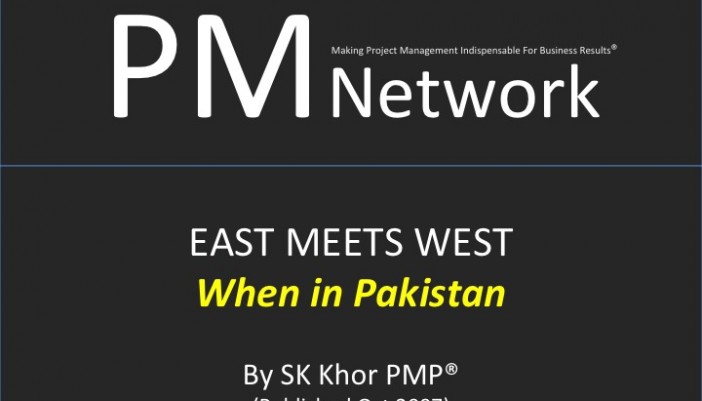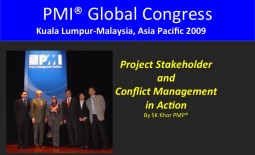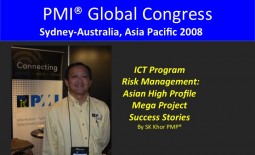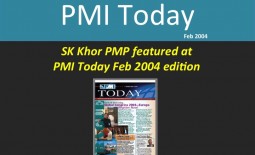PMI PM Network (Oct 2007): When in Pakistan
[vc_row][vc_column width=”1/1″][vc_column_text]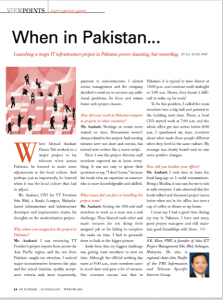
Shorter version of this paper will be published in the 2007 Edition of PMI’s PM Network monthly Magazine.
Getting the mega IT Infrastructure done on-time in Pakistan : Issues and Challenges
In an exclusive interview, PMI PM Network Contributing Editor for the Asia Pacific region, Mr. SK Khor, PMP® speaks to Mr. Ahmad Azahari Pawan Teh an experienced project manager, who just recently completed a mega telecommunication infrastructure project in Pakistan.
Azahari talks about the unique challenges , issues and techniques he used in leading and managing a team of more than 300 people to complete one of the major modernisation efforts in Pakistan.
The project scope was to lay the telecommunications cables across Pakistan which can subsequently be rented, leased or sold to different telecom service providers to provide voice , data , internet or multimedia services. The project team was scattered across the country as far as 4,500 km apart.
Azahari has more than 20 years of experience in leading and managing Information Technology and telecommunication projects across the Asia Pacific region. He used to as head of technical division for an international telecommunications player based in Malaysia and currently as Chief Technology Officer for TT Frontiers Sdn Bhd in Malaysia.
Mr SK: Why where you assigned to the project in Pakistan ?
Azahari: One afternoon, as usual I was reviewing various project reports from across the Asia Pacific Region and the Monthly Project Report from Pakistan caught my attention. I noticed major inconsistencies between the job of completion, timeline, quality acceptance criteria and most importantly payment to sub-contractors.
I alerted senior management and advised them to send someone from headquarters to Pakistan to better understand the actual situation. The senior management decided to send me to Pakistan to uncover more problems, fix them and return home with perfect project closure. This eventually led to me becoming the Chief Technology Officer for six months for this multimillion dollar project !!
Mr. SK : What was different about your encounters here compared to projects outside of Pakistan ?
Azahari : I made some interesting observations in the first week. Meetings or events never started on time, a lot of discussions took place on project or non-project related issues and the project meeting minutes were not short and concise but was written in the movie script format.
My first month was filled with challenging questions from my direct and indirect reporting staff. Since I was the Project Director, they also expected me to know everything. I felt that the local team leaders were conducting informal assessments on my technical expertise.
It was not easy to ignore their questions or say ‘I don’t know’ because the locals view an expatriate as someone who is more knowledgeable and skilful since he comes from a more “advanced country”. Otherwise an expatriate who enjoys a lot of benefits is considered a wasteful ‘import’.
My years of experience in projects in the IT and telecommunications industry helped me to handle this situation.
Mr SK : What were the challenges faced in handling this project team?
Getting the 300 odd staff to work as a team was a real challenge. I had four General Managers directly reporting to me. More than 20 Project Managers reported to these four General Mangers and each Project Managers were responsible for 10 to 20 project team members.
They blamed each other and made excuses for not doing the job assigned or when failing to complete the tasks on time.
Being the boss, I was just as responsible for any delay or incompletion of tasks. Hence, I decided to put a stop to this behaviour.
I had to spend time and effort to persuade them to look at the bigger picture, to view the situation from the entire project and/or from the company perspective and not at personal or sub-project level. I did manage to impart some team work concept but it was not an easy task.
Aside from this, my biggest challenge was getting my entire project team to start their day on time. Although the official working hour starts at 9.00am, team members came in much later. A lot of excuses were given for coming in late to work. One commonly heard excuse was that it is the Pakistani culture to have dinner at 10.00pm and continue until midnight or 1 am in the morning. Hence, they sleep late and find it difficult to wake up early for work!!
To fix this punctuality problem, the management tried some frequently used Western techniques but nothing really worked. We even made a decision to impose salary cut for late comers but this also did not make any significant change.
Then one day I called the entire project team members into a big hall which had direct view of the next building. I pointed them to this office building which had a local Chief Executive Officer who started work at 7.00am and the whole office got into action before 8.30am.
I questioned my team members about what made them different when in fact they live in the same culture and environment as the people in the building next door.
My message was clearly heard and understood by a majority of the team members and we saw some positive changes.
Mr. SK : How different was it in managing contractors and sub-contractors?
Azahari: Same as else where, our contractors and sub-contractors will find ways to get paid faster without completing the work as agreed upon. They would try to lie about project status and present misleading information in the project reports.
Some of my project managers without much hands-on experience couldn’t put their fingers on the false reports. It was also not easy for them to prove the actual situation and it was not practical to request the contractors to show the actual work done as it will involve project resources and time.
I then introduced the Independent Project Quality and Audit team from third party organisations and also management surprise visit. We established standardised quality and audit processes and communicated with contractors that the project quality reports and audit reports will contribute to the decision on their claims or payment.
This move did help to put a stop to poor quality of work.
Mr SK: What were your localization efforts ?
Azahari : I am always sensitive whenever in a different country. The same applied when I was in Pakistan. I took time to learn the local language to be able to communicate with the locals. Being a Muslim, it was easy for me to mix around with everyone in the predominantly Muslim country.
That aside, I also observed that the locals talked/discussed about project issues better when not in the office but over a cup of coffee or dinner at my home. I must say I have a good time during my stay in Pakistan and I have met many good Project Managers and still maintain good friendship with them.
[/vc_column_text][/vc_column][/vc_row]

